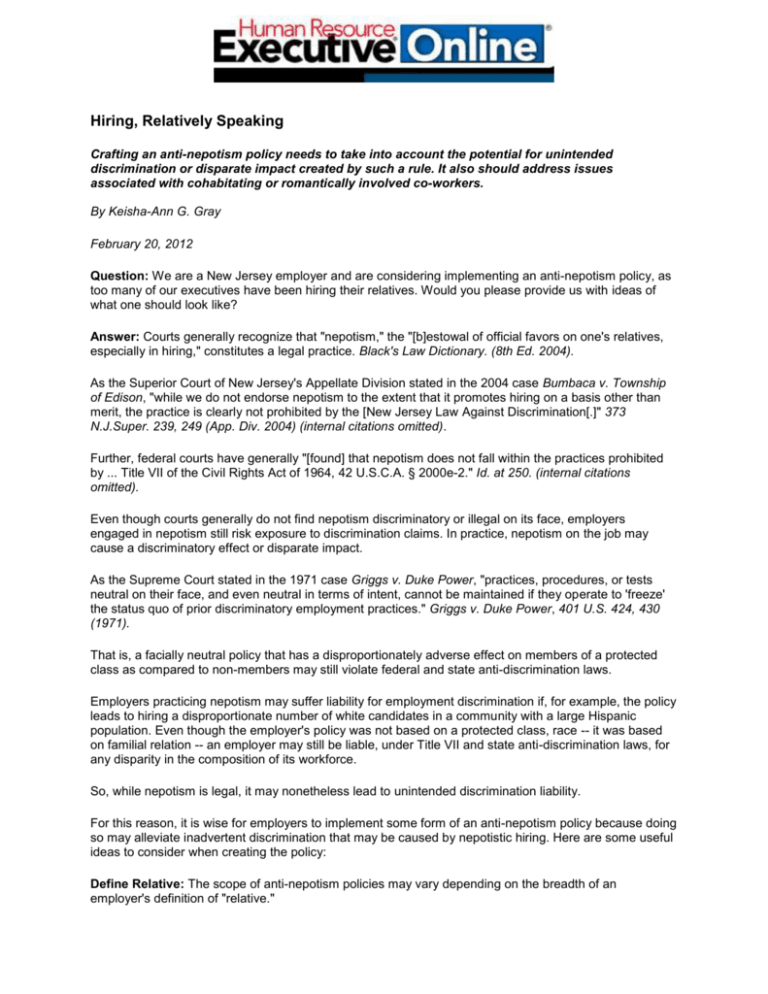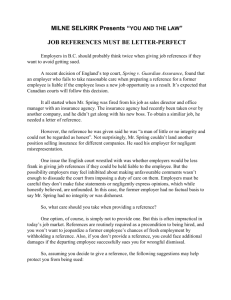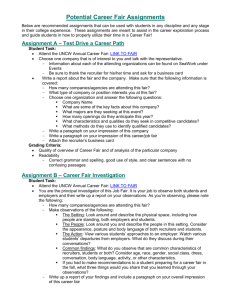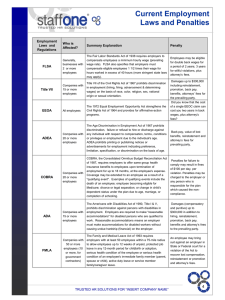Hiring, Relatively Speaking
advertisement

Hiring, Relatively Speaking Crafting an anti-nepotism policy needs to take into account the potential for unintended discrimination or disparate impact created by such a rule. It also should address issues associated with cohabitating or romantically involved co-workers. By Keisha-Ann G. Gray February 20, 2012 Question: We are a New Jersey employer and are considering implementing an anti-nepotism policy, as too many of our executives have been hiring their relatives. Would you please provide us with ideas of what one should look like? Answer: Courts generally recognize that "nepotism," the "[b]estowal of official favors on one's relatives, especially in hiring," constitutes a legal practice. Black's Law Dictionary. (8th Ed. 2004). As the Superior Court of New Jersey's Appellate Division stated in the 2004 case Bumbaca v. Township of Edison, "while we do not endorse nepotism to the extent that it promotes hiring on a basis other than merit, the practice is clearly not prohibited by the [New Jersey Law Against Discrimination[.]" 373 N.J.Super. 239, 249 (App. Div. 2004) (internal citations omitted). Further, federal courts have generally "[found] that nepotism does not fall within the practices prohibited by ... Title VII of the Civil Rights Act of 1964, 42 U.S.C.A. § 2000e-2." Id. at 250. (internal citations omitted). Even though courts generally do not find nepotism discriminatory or illegal on its face, employers engaged in nepotism still risk exposure to discrimination claims. In practice, nepotism on the job may cause a discriminatory effect or disparate impact. As the Supreme Court stated in the 1971 case Griggs v. Duke Power, "practices, procedures, or tests neutral on their face, and even neutral in terms of intent, cannot be maintained if they operate to 'freeze' the status quo of prior discriminatory employment practices." Griggs v. Duke Power, 401 U.S. 424, 430 (1971). That is, a facially neutral policy that has a disproportionately adverse effect on members of a protected class as compared to non-members may still violate federal and state anti-discrimination laws. Employers practicing nepotism may suffer liability for employment discrimination if, for example, the policy leads to hiring a disproportionate number of white candidates in a community with a large Hispanic population. Even though the employer's policy was not based on a protected class, race -- it was based on familial relation -- an employer may still be liable, under Title VII and state anti-discrimination laws, for any disparity in the composition of its workforce. So, while nepotism is legal, it may nonetheless lead to unintended discrimination liability. For this reason, it is wise for employers to implement some form of an anti-nepotism policy because doing so may alleviate inadvertent discrimination that may be caused by nepotistic hiring. Here are some useful ideas to consider when creating the policy: Define Relative: The scope of anti-nepotism policies may vary depending on the breadth of an employer's definition of "relative." Some employers simply limit hiring of spouses or immediate family members. Others take an expansive view, including not just immediate and extended family, such as cousins and grandparents, but even individuals with whom an employee cohabitated during the previous year. It is not uncommon for an employer to permit relatives to work in the same company, but often antinepotism rules will require they work in different departments. And one relative is generally never allowed to supervise another as the risk of favoritism and special treatment in this situation is often too great. Address Intimate Relationships: Employers should decide whether to include a policy governing consensual romantic or sexual relationships. Any practice requiring sexual favors for advancement will violate federal and state sexual-harassment laws and sex-discrimination prohibitions. Title VII of the Civil Rights Act of 1964, 42 U.S.C. § 2000e. But trickier situations arise when employees engage in consensual personal relationships. While these intimate relationships pose challenges unique to anti-nepotism, both issues present employers with similar administrative questions. For example, just as employers will generally forbid one relative from supervising another, employers would be wise to take a similar position with regard to employees in a romantic relationship. Employers must also prepare for the fallout of employee relationships gone wrong. Generally, viable employer actions include requiring employees to report romantic relationships to the company so that reporting structures can be altered to remove a "couple" from a supervisor/subordinate reporting chain if need be. But employers should consider factors unique to their company before deciding on a course of action or policy. For example, an employer should consider whether the company is sufficiently large enough to transfer an employee to a job in another department. And if an employer transfers an employee to a new department, the employer must determine if that action puts the company at risk of violating antidiscrimination laws. Employers must be cognizant of an employee's individual circumstances, and should avoid arbitrarily transferring employees. Employees engaged in protected activity -- such as reporting employment discrimination to a supervisor or the Equal Employment Opportunity Commission -- may claim retaliation or employment discrimination if they are transferred to another department or position that does not provide the same salary, responsibilities or prestige. See Burlington Northern & Santa Fe Railway Co. v. White, 548 U.S. 53 (2006). Detailing the employer's practices concerning romantic and sexual relationships in an anti-nepotism policy may prevent employer liability for discrimination or retaliation. Employers can more readily demonstrate their actions were lawful and non-discriminatory if they are in conformity with a written policy of which the employee was made fully aware. Consider the Implications of Marriage: Be aware that some states have found that anti-nepotism policies targeted at married individuals violate marital-status protections. Employers in California and Washington should be particularly mindful of how they implement and apply these policies. In Andrews v. Harrison Medical Ctr., for example, the Washington Court of Appeals found that an antinepotism policy directed only at married couples and not couples in a committed intimate relationship generally, violated state anti-discrimination protections. Andrews v. Harrison Medical Ctr.,158 Wn. App. 1043 (Ct. App. 2010). Employers in these districts may still implement anti-nepotism policies based on marital status, but must be sure to have a "business necessity" justification. To assert such a defense, "an employer must prove that the challenged employment practice used significantly correlates with the fundamental requirements of job performance." Id. For example, if marriage creates an employment situation "[w]here one spouse would have the authority or practical power to supervise, appoint, remove, or discipline the other," or "[w]here one spouse would be responsible for auditing the work of the other," an employer may have a legitimate business justification for its policy. Id. Take Away Employers must take care in drafting anti-nepotism policies and it is always a good idea to do so with the close assistance of legal counsel familiar with the laws in your jurisdiction. Such policies, while generally legal, may inadvertently expose employers to employment discrimination. While state laws largely conform with federal law, employers should be aware of any unique discrimination requirements state statutes impose on a company. Keisha-Ann G. Gray is senior counsel in the Labor & Employment Law Department of Proskauer in New York and co-chair of the Department's Employment Litigation and Arbitration Practice Group.






